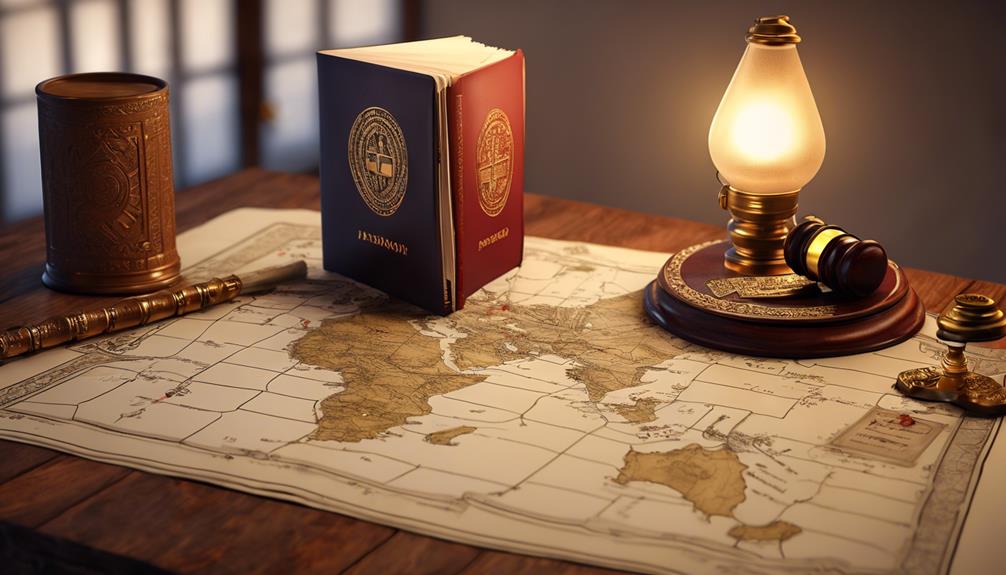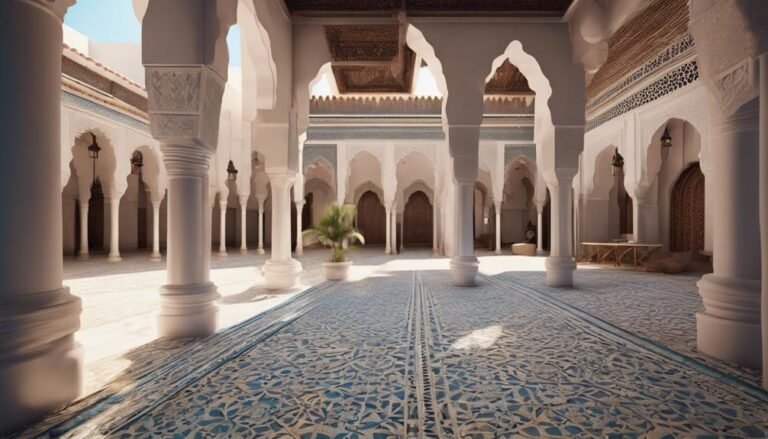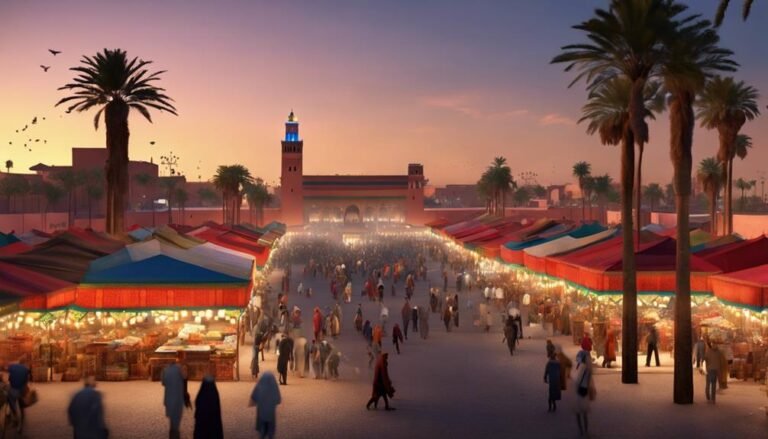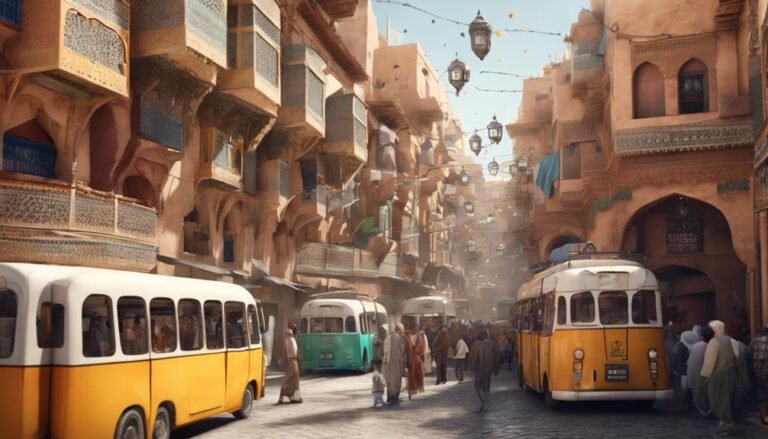When in Morocco, respect the strict dress code by dressing modestly, especially at religious sites. Keep public displays of affection minimal to avoid legal consequences. Follow alcohol restrictions to stay within the cultural norms. Ask before taking photos, particularly in sensitive areas. Beware of harsh drug laws to prevent severe penalties. Learning about etiquette at religious sites and currency rules is vital. Adhere to driving laws and embrace cultural customs for a harmonious trip. Understanding these laws enhances your experience and guarantees a respectful visit to Morocco.
Key Takeaways
- Respect strict dress codes, prioritize modesty.
- Understand and adhere to public display of affection norms.
- Be aware of alcohol restrictions and limited availability.
- Comply with photography laws, ask for permission.
- Avoid drugs due to severe penalties and strict enforcement.
Dress Code Regulations
When visiting Morocco, tourists must adhere to the country's strict dress code regulations to show respect for the local culture and customs. Morocco's cultural norms dictate that modesty is key, especially when visiting religious sites. For both men and women, it's essential to dress conservatively. Avoiding clothing that's too revealing or tight is vital.
When heading to the beach in Morocco, it's worth mentioning that beach attire should still be modest. Women should opt for one-piece swimsuits or modest two-piece swimsuits that cover the midriff. Men should wear appropriate swim trunks rather than overly revealing speedos.
For visits to religious sites like mosques, both men and women should make sure that their clothing covers their shoulders, chest, and knees. Women may also need to cover their heads with a scarf as a sign of respect.
Understanding these dress code regulations won't only show respect for the local culture but also help you have a more enriching and enjoyable experience during your stay in Morocco.
Public Display of Affection
When visiting Morocco, it's crucial to be mindful of cultural norms regarding public displays of affection (PDA). Understanding the local attitudes towards PDA can help you avoid any unintended disrespect or discomfort.
It's also important to note the potential legal consequences associated with excessive PDA in public spaces.
Cultural Norms on PDA
Understanding the cultural norms regarding Public Display of Affection (PDA) in Morocco is essential for tourists to navigate social interactions respectfully. Morocco is a conservative society where public displays of affection are generally frowned upon. Social boundaries are more conservative compared to Western countries, and cultural differences play a significant role in shaping these norms.
Holding hands is typically acceptable for married couples but kissing and hugging in public should be avoided. It's important to be mindful of your actions and the cultural context to show respect for the local customs. Being aware of these norms can help you avoid unintentionally causing discomfort or offense to the local population and promote a more pleasant stay in Morocco.
Legal Consequences for PDA
In Morocco, guaranteeing a pleasant stay can lead to legal consequences due to the conservative societal norms and laws in place. Social norms in Morocco heavily emphasize modesty and discretion, particularly in public spaces.
Displaying affection publicly, such as kissing or hugging, is viewed as inappropriate and disrespectful. It's essential to respect relationship boundaries and avoid any behavior that may be considered offensive or indecent by local standards.
Violating these norms can result in legal repercussions, including fines or even imprisonment. To guarantee a pleasant stay in Morocco, it's advisable to be mindful of these cultural sensitivities and express affection in a more private and reserved manner.
Local Attitudes Towards PDA
Local attitudes towards public displays of affection in Morocco reflect the deeply ingrained cultural emphasis on modesty and discretion. Moroccans generally prefer to keep intimate interactions private, respecting social boundaries and cultural differences.
While holding hands is generally accepted, kissing and hugging in public may be met with disapproval. It's essential for tourists to be mindful of these customs to avoid causing offense or discomfort.
Understanding and respecting these local norms can help visitors navigate social interactions more smoothly. Being aware of the cultural emphasis on modesty allows for a more enriching and respectful experience while exploring Morocco.
Alcohol Consumption Restrictions
Tourists visiting Morocco are subject to strict alcohol consumption restrictions enforced by local laws and customs. Unlike many Western countries, Morocco has conservative views on alcohol, with restrictions in place. While alcohol is available in some hotels, restaurants, and bars that cater to tourists, it isn't as widely accepted in public spaces as in other countries. The nightlife scene in Morocco is vibrant, but alcohol consumption is mostly confined to licensed establishments.
When enjoying beach activities, it's essential to be mindful of where and how alcohol is consumed. Public intoxication and drinking alcohol on public beaches aren't tolerated and can lead to fines or even legal consequences. It's advisable to respect local customs and adhere to the regulations regarding alcohol consumption to avoid any issues during your stay.
Photography and Privacy Laws
Exploring Morocco as a visitor, it's essential to comprehend the photography and privacy laws to guarantee a respectful and important experience during your travels. When capturing moments in Morocco, be mindful of privacy concerns and respect individuals' boundaries. Always ask for permission before taking someone's photograph, especially in more intimate settings or religious sites. Some locals may feel uncomfortable having their picture taken, so it's vital to be courteous and considerate of their wishes.
Understanding photography etiquette is key to maneuvering the cultural landscape of Morocco. While the country offers picturesque scenes, it's important to remember that not all settings are appropriate for photography. Certain places, like military installations or government buildings, prohibit photography for security reasons. Additionally, when taking photos of locals, be aware of their cultural boundaries and traditions. Respect their customs and seek consent before snapping a picture.
Drug Laws and Penalties
Getting around Morocco requires a thorough understanding of the country's strict drug laws and the severe penalties that accompany any violations. Moroccan drug laws are strict, and it's essential for tourists to educate themselves about the consequences of drug possession. Possessing even small amounts of illegal substances can lead to severe penalties, including hefty fines, imprisonment, and deportation. It's worth mentioning that the legal system in Morocco may differ greatly from what you're accustomed to, so it's best to avoid any involvement with drugs altogether.
Tourist warnings emphasize the need for traveler education regarding drug laws in Morocco. Being caught with drugs can have serious implications, potentially ruining your trip and leading to legal troubles. Remember that ignorance of the law isn't an excuse, and the authorities will enforce the regulations strictly. To ensure a safe and enjoyable visit, respect the local laws and customs, and steer clear of any involvement with illegal substances. Stay informed, stay safe, and make the most of your time exploring this beautiful country.
Etiquette in Religious Sites
When visiting religious sites in Morocco, remember to adhere to the dress code expectations, which often include covering your shoulders and knees.
Be mindful of photography restrictions, as some sites may prohibit taking photos inside or around the premises.
Respecting these guidelines shows reverence for the religious significance of these places.
Dress Code Expectations
Visitors to religious sites in Morocco are expected to adhere to modest dress codes as a sign of respect for the local customs and traditions. Importance expectations are vital, with social norms dictating that both men and women should dress conservatively. For men, it's recommended to wear long pants and shirts that cover the shoulders. Women are advised to wear loose-fitting clothing that covers their arms, legs, and chest.
Clothing guidelines emphasize avoiding clothing that's too revealing or tight. Understanding and following these fashion standards not only show respect for the religious significance of the site but also demonstrate cultural awareness and sensitivity. By dressing appropriately, you can ensure a positive and respectful experience during your visit to religious sites in Morocco.
Photography Restrictions
Respecting photography restrictions at religious sites in Morocco is essential to honor the sanctity of the location and the privacy of worshippers. When visiting these sites, it's important to be mindful of any signage indicating where photography is prohibited. Some religious sites may require a photo permit for capturing images, so it's advisable to inquire beforehand or at the entrance.
As a tourist, it's vital to adhere to these rules as a sign of respect for the religious practices and beliefs of the local community. By following proper tourist etiquette and refraining from taking photos where restricted, you contribute to maintaining the sanctity of these sacred places and ensure a positive experience for both yourself and others.
Currency Import and Export Rules
In addition, it's crucial to be aware of the currency import and export rules in Morocco when planning your visit. When entering or leaving Morocco, you must declare amounts over MAD 100,000 or its equivalent in foreign currency to customs officials. Failure to do so can result in fines or confiscation of the excess amount. Additionally, there are restrictions on the export of dirhams, with a limit of MAD 1,000 when leaving the country.
Morocco has regulations in place concerning import duties and exchange rates. It's important to be informed about these regulations to avoid any issues during your trip. Import duties vary depending on the items you bring into the country, so it's advisable to check with Moroccan customs to determine the specific duties applicable to your belongings. Being aware of the current exchange rates will also help you make informed decisions when exchanging your money.
Driving Laws and Regulations
Understanding and adhering to Moroccan driving laws and regulations is important for a safe and enjoyable travel experience in the country. When driving in Morocco, it's vital to follow road safety precautions and driving etiquette to guarantee your safety and that of others on the road. Familiarize yourself with the traffic regulations and license requirements to avoid any legal issues during your trip.
To provide a clear overview, here is a table summarizing some key points:
| Topic | Description |
|---|---|
| Road Safety Precautions | Always wear a seatbelt, follow speed limits, and be cautious of pedestrians and cyclists. |
| Driving Etiquette | Be courteous to other drivers, use your signals, and yield to oncoming traffic when necessary. |
| Traffic Regulations | Respect traffic lights, avoid using a phone while driving, and be mindful of road signs. |
| License Requirements | Make sure you have a valid international driving permit along with your original driver's license. |
Cultural Sensitivities and Customs
Getting through Moroccan cultural sensitivities and customs demands a vital approach to guarantee a harmonious interaction with locals and a deeper appreciation of the country's rich heritage. When visiting Morocco, you may encounter language barriers, as Arabic and Berber are the official languages. While many Moroccans speak French, especially in urban areas and tourist spots, English mightn't be as widely understood. Learning a few basic Arabic or French phrases can go a long way in bridging these communication gaps and showing respect for the local culture.
In addition to language barriers, being mindful of social customs is essential. Moroccans value hospitality and politeness, so greeting people with a smile and a handshake is customary. When invited into a Moroccan home, it's polite to bring a small gift as a token of appreciation. Moreover, dressing modestly, particularly when visiting religious sites or rural areas, shows respect for local traditions. Remember, embracing these social customs not only enhances your travel experience but also fosters positive cultural exchanges with the Moroccan people.
Conclusion
As you explore the vibrant culture and stunning landscapes of Morocco, remember to respect the local laws and customs.
By being aware of the dress code regulations, public display of affection restrictions, alcohol consumption rules, and other important guidelines, you can guarantee a smooth and enjoyable visit.
Just like a colorful tapestry woven with intricate threads of tradition, following these laws will help you blend seamlessly into the rich tapestry of Moroccan society.

The Editorial Team is a passionate group of Morocco enthusiasts dedicated to sharing the beauty, culture, and wonders of this captivating country. With diverse backgrounds and a deep love for travel, we strive to bring you engaging and informative content that inspires your Moroccan adventures. From uncovering hidden gems and sharing local insights to exploring mouthwatering cuisine and showcasing the vibrant lifestyle, our team is committed to providing you with valuable resources and exciting stories that enhance your exploration of Morocco. Join us on this journey as we celebrate the rich heritage and unforgettable experiences that make Morocco truly special.







